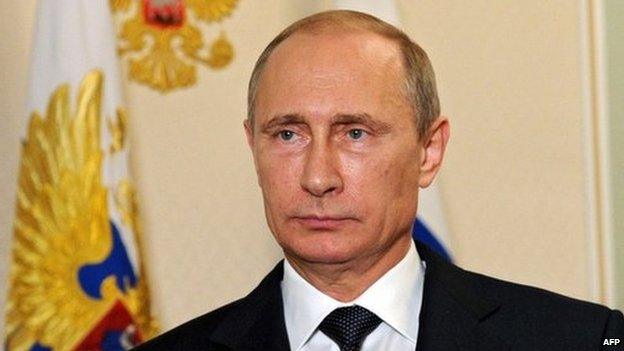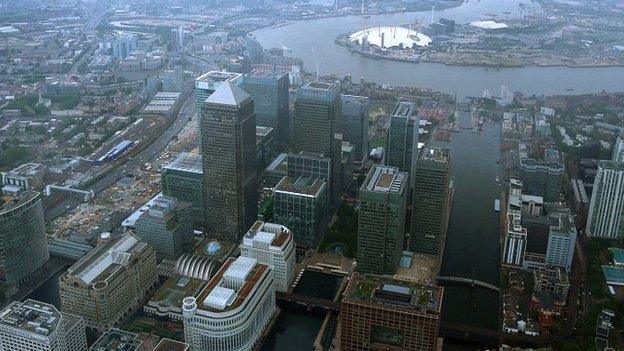Russia: how tough a response?
- Published
- comments

Members of Vladimir Putin's inner circle have been targeted by existing sanctions
The rhetoric could scarcely sound tougher but will the reality come close to matching it?
David Cameron, writing in yesterday's Sunday Times. said that "for too long there has been a reluctance on the part of too many European countries to face up to the implications of what is happening in eastern Ukraine."
"It is time to make our power, influence and resources count," he wrote.
Ed Miliband, speaking in Washington DC on Monday, agreed, saying "the international community has not done enough to show that Russian aggression cannot be allowed to stand" and "European unity must not be an excuse for European inaction".
Whilst Nick Clegg said at his news conference this morning that the EU had so far failed to "act with the right collective resolve," adding that "we believe the time has now come for sanctions to be tightened further and that is precisely what we will be seeking to deliver in the meetings in the EU later this week".
So that's clear enough then. There's just one problem. The next round of sanctions will not be determined by Britain but by the EU's 28 member states.
Caution

Russia has substantial financial interests in London
As my colleague Gavin Hewitt - the BBC's Europe Editor - points out on his blog, Europe has been very tentative in what it's willing to do to take on Russia and there's no reason to think that caution won't continue.
He writes that "Italy with its fragile economy, which continues to hover close to recession, is very dependent on Russian energy. Germany has 6,000 firms which do business in Russia. Some of its leading industrialists have been vocal in opposing sanctions. France has resisted pressure to halt delivery of two Mistral helicopter carriers to Russia."
You might think that The Netherlands would be leading the way in taking on Russia. Their attitude will, of course, have been changed by last week's national tragedy but remember that the EU country with the largest trade deficit is, you guessed it, the Netherlands.
The last figures showed that figure to be over 16 billion euros (£12.6bn), according to data from Eurostat.
Some EU countries argue that the most effective sanctions would be financial, stopping Russia accessing the City of London. That, of course, would hit the UK and not the rest of the EU.
City of London
You may recall that in March I revealed the existence of a photograph of a document which a senior official was carrying into a meeting in Downing Street which said that "the UK should not support, for now, trade sanctions or close London's financial centre to Russians".
Nothing has changed since then, I'm told.
So, sources tell me that we should expect some gradual movement in Brussels tomorrow rather than a dramatic tightening of the screw.
This is not just for selfish economic reasons but also because many EU countries argue that their best - or maybe their only - hope of getting access to the crash site and getting co-operation with the investigation is to maintain a dialogue with President Putin
In a news conference on Monday, Angela Merkel's spokeswoman, Christiane Wirtz, said industry-wide sanctions were not being considered but Berlin was prepared to target individual companies.
After speaking to Angela Merkel and Francois Hollande, Mr Cameron said he was "very clear that the EU will be ready to take further steps in terms of other areas, other areas of ... some forms of advanced industrial goods that might have dual uses for defence purposes as well".
In other words, even the deaths of almost 300 people in a crash which most EU countries blame Russian-backed separatists for will not lead directly to what many people will see as a tough response.